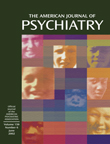Beneficial Antipsychotic Effects of Celecoxib Add-On Therapy Compared to Risperidone Alone in Schizophrenia
Abstract
OBJECTIVE: Abnormalities in the immune system in schizophrenia have been described. However, important findings such as high levels of activating cytokines in the CSF and signs of CNS inflammation have been controversial. The authors conducted a trial of the new selective cyclooxygenase-2 inhibitor celecoxib, an immunomodulatory drug, in schizophrenic patients to evaluate its therapeutic effects. METHOD: In a prospective, double-blind evaluation, 50 patients with an acute exacerbation of schizophrenia were randomly assigned to either risperidone plus celecoxib or risperidone plus placebo. After a washout period, 25 patients received 2–6 mg/day of risperidone plus placebo and 25 received risperidone plus 400 mg/day of celecoxib for 5 weeks. The treatment effect was calculated by analysis of covariance. There were no significant differences between groups in age, sex, duration or severity of disease or psychopathology, or risperidone dose or plasma level. RESULTS: Over 5 weeks, both groups of patients showed significant improvement in scores on the Positive and Negative Syndrome Scale and on all subscales. However, the celecoxib group showed significantly greater improvement in the total score. CONCLUSIONS: Additional treatment with celecoxib has significant positive effects on the therapeutic action of risperidone with regard to total schizophrenia psychopathology. Moreover, the fact that treatment with an immunomodulatory drug showed beneficial effects on schizophrenia symptoms indicates that immune dysfunction in schizophrenia is not just an epiphenomenon but is related to the pathomechanism of the disorder. However, a nonimmunological therapeutic effect of celecoxib mediated by the N-methyl-d-aspartic acid receptor has to be taken into account.



